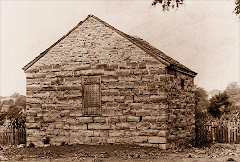 During the difficult Missouri period of 1838, many saints fell away from the church. Some left of their own accord and many others, men who had been stalwarts in the faith, were excommunicated for their wickedness and apostasy. Among the spiritual casualties of this time was William W. Phelps, one of the Presidents of the Church in Zion, church printer, and close friend to the prophet Joseph Smith.
During the difficult Missouri period of 1838, many saints fell away from the church. Some left of their own accord and many others, men who had been stalwarts in the faith, were excommunicated for their wickedness and apostasy. Among the spiritual casualties of this time was William W. Phelps, one of the Presidents of the Church in Zion, church printer, and close friend to the prophet Joseph Smith.W.W. Phelps was accused of using church money for his own personal purposes and was excommunicated in March of 1838. After his excommunication Phelps appeared in a hearing before Judge Austin King at Richmond in late 1838 and testified falsely of Joseph Smith’s advocacy in resisting all law and of his involvement in engineering the burning and plundering of the towns of Gallatin and Millport. Phelps testimony, combined with other dissenters bolstered the State’s case and led to the incarceration of Joseph Smith and other church leaders. As a true apostate, Phelps desired not only to be separated from the church, but also to destroy the church and its leaders.
After his separation from the Church, W.W. Phelps moved to Dayton Ohio. In 1840 Orson Hyde and John E. Page found Phelps impoverished but humble and urged him to write to the prophet for the purpose of regaining his fellowship with the saints. On June 29, 1840 Phelps wrote the following…
“I am as the prodigal son, though I never doubt or disbelieve the fullness of the gospel… I have seen the folly of my way, and I tremble at the gulf I have passed. I prayed and God answered, but what could I do? Says I, Oh, I will repent and live, and ask my old brethren to forgive me, and though they chasten me to death, yet I will die with them, for their God is my God… I want to be saved if my friends will help me… I have done wrong and I am sorry. I ask forgiveness in the name of Jesus Christ of all the Saints, for I will do right, God helping me.”
The Prophet Joseph Smith responded with a letter dated July 22, 1840. In part his letter is as follows…
“Our hearts were melted into tenderness and compassion when we ascertained your resolves and I can assure you I feel a disposition to act on your case… and agreeably to the principles of truth and righteousness which have been revealed and inasmuch as long-suffering patience and mercy have ever characterized the dealings of our Heavenly Father towards the humble and penitent, I feel disposed to copy the example and cherish the same principles, by so doing be a Savior of my fellow men.
It is true that we have suffered much in consequence of your behavior, the cup of gall already full enough for mortals to drink, was indeed filled to overflowing when you turned against us. Had it been an enemy we could have borne it. However, the cup has been drunk, the will of our Heavenly Father has been done and we are yet alive for which we thank the Lord.
Believing your confession to be real and your repentance genuine, I shall be happy once again to give you the right hand of fellowship and rejoice over the returning prodigal. Your letter was read to the Saints last Sunday and an expression of their feeling was taken, when it was unanimously resolved that W.W. Phelps should be received into fellowship.”
‘Come on dear Brother since the war is past,
For friends at first are friends again at last.’
Despite the personal betrayal, the pain, anguish and imprisonment Joseph suffered because of William W. Phelps, Joseph and the Saints welcomed back the prodigal son with ‘tenderness and compassion’. Among W.W. Phelps many accomplishments, he is perhaps best known as the composer of some of the most beloved Church Hymns we still sing today. These songs include Adam Ondi Ahman and one of my favorites, Praise to the Man which was written after his return into Church fellowship. When considering the road he had traveled the words W.W. Phelps penned and put to music in Praise to the Man are even more beautiful and inspiring.
William W. Phelps traveled the hard road but ultimately delivers to our eyes a great example of humility and repentance. Joseph Smith on the other hand, as a prophet of God, sets an example for us all in offering honest, personal forgiveness to those who have wronged us, regardless of the heinousness of the offence. Hopefully we can be wise and learn from Phelps’ experience so we do not travel the same hard road, but also follow the example of the prophet and offer tender forgiveness and compassion to others in spiritual need.























No comments:
Post a Comment